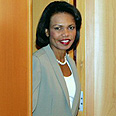
North Korea's nuclear test could set off an atomic arms race in Asia, Secretary of State Condoleezza Rice acknowledged Tuesday, even as she sought to reaffirm US obligations to defend the two nations most at risk of being attacked.
In addition to settling nerves among allies, Rice's trip is meant to reinforce pressure on South Korea and especially China to enforce sanctions, including what the United States describes as an aggressive inspection and interdiction program that would stop short of a full blockade of North Korean trade.
The United States is worried that Japan and South Korea may want to develop their own nuclear weapons programs to counter the threat from North Korea, and part of Rice's assignment on a hastily arranged trip to Asia this week is to lessen that temptation.
"Obviously an event of this kind does carry with it the potential for instability in the relationships that now exist in the region," Rice said en route to Japan, her first stop on a tour devoted almost entirely to answering North Korea's nuclear threat.
"That's why it's extremely important to go out and to affirm, and affirm strongly, US defense commitments to Japan and to South Korea," Rice said.
Pushing for full participation
Rice's diplomatic language refers to the calculus of nuclear deterrents and to the long-standing US pledge to use its nuclear arsenal to defend its friends.
A senior Bush administration official traveling with Rice said the United States is pushing for full participation in the effort to block banned imports or exports but acknowledged that individual countries may interpret their obligations differently.
UN sanctions ban trade with the North in major weapons and materiel that could be used in its ballistic missile and weapons of mass destruction programs. They ask all countries to inspect cargo to and from North Korea to enforce the prohibition, although it is not clear how that would work in practice.
"We do not envision this regime as an embargo, quarantine or a blockade," said the official, who spoke on condition of anonymity because Rice has not yet met with her Asian counterparts.
The official said that all shipments crossing land borders to or from North Korea should be inspected, and that countries are obligated to check ships in their own waters or ports that may be bearing North Korean goods.
South Korea, Japan respond
South Korea has said it would fully comply with the sanctions but also has indicated that it does not plan to halt economic projects with the North, despite Washington's fears they might help finance the North's nuclear and missile programs.US Secretary of State Condoleezza Rice plans to ask South Korea to expand its role in a US-led international program to stop the spread of weapons of mass destruction to implement the UN sanctions resolution against North Korea, the US ambassador said Wednesday.
South Korea has been reluctant to fully participate in the US-led Proliferation Security Initiative (PSI) because of concerns it may upset North Korea and spoil efforts to persuade the communist state to give up its nuclear ambitions.
Japan has also agreed to impose sanctions, but not beyond. Japanese Prime Minister Shinzo Abe has ruled out developing nuclear weapons, but a ruling party policy director raised that possibility soon after North Korea's Oct. 9 test.
In Tokyo, where Rice holds meetings Wednesday, Japanese Foreign Minister Taro Aso said his government was aware of reports that North Korea could be readying another blast.
"We have information, but I cannot speak about its contents," Aso told reporters, without elaborating. Japan and the United States have gone beyond those measures to impose or propose separate financial, trade and other restrictions on North Korea over what the US claims is a pattern of lawbreaking by a rogue nation.
North Korea undaunted
China has long been one of North Korea's few friends, but relations frayed in recent months when the North ignored China's warnings not to conduct missile tests or last week's nuclear test. China has given conflicting signals about its commitment to enforcing the sanctions.Even with full Chinese compliance, it isn't clear that the sanctions could pressure North Korea to resume multi-country negotiations on dismantling its nuclear programs.
Earlier Tuesday, the communist North said UN sanctions aimed at punishing the country for its nuclear test amount to a declaration of war. The government said it would not cave under such pressure now that it is a nuclear power.
The government further reported that it would not be deterred from its nuclear program, and that future tests - apparently a series of tests - were anticipated.
In a preliminary response to the UN sanctions, North Korea warned that it "wants peace but is not afraid of war" and declared it would "deal merciless blows" against anyone who violates its sovereignty.
Rice called the response "unsurprising" but would not comment in detail about reports that the North may be preparing for a second test explosion. "We're concerned about further action by the North Koreans," she said, "but further action by the North Koreans will only deepen its isolation, which is pretty deep right now."















